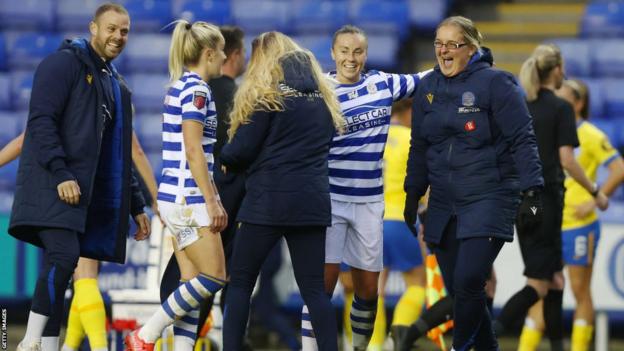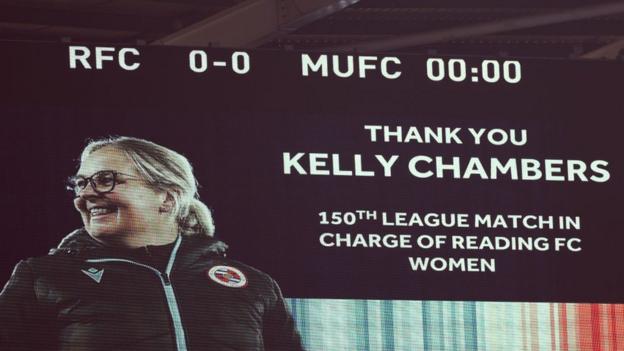
There has always been one ever-present for Reading since their inception in 2006 – manager Kelly Chambers.
When her first child was born in 2016, she took just two weeks off work, feeling unable to leave her relegation-battling team any longer than that in mid-season.
The 37-year-old is expecting her second child in the WSL off-season and joked she had planned it better this time around.
“I’ve got a good month from the end of the season before the baby comes this time,” Chambers told BBC Sport.
“When I had Harley I was halfway through a season and felt I needed to be back. My full focus now is obviously staying healthy, keeping the baby healthy, then keeping the job in hand for the team.”
Chambers has been with the club for more than 15 years, first as a player until 2012, then as part of the management team in various roles.
Having led the club since 2015, she oversaw her 150th WSL game last month and remains, alongside Chelsea’s Emma Hayes, the longest-serving manager currently in the league.
“I suppose Reading FC is like a family,” said Chambers. “I was born in Reading, I’m a Reading girl and did I ever think I’d be in the place I’m in now? Not in a million years.
“I just love football, I love Reading and I love the job. The relationship I have with the club is joyful and challenging.
“More recently it’s a love-hate relationship, but who doesn’t have that in a family? It’s been more challenging in recent seasons.
“But it’s pretty much been my life since I was a little girl and I’ve grown up with some of the people here. That’s how it feels – like a family.”
‘I had no idea what to do’
Chambers’ football journey began, like many others, at primary school where she was inspired by her year six teacher and his daughter, who played for a local team.
Reading FC did not have a women’s youth set-up at the time, but multiple teams who were affiliated with the club. Chambers represented one of those – Reading Royals.
She eventually joined Reading FC in 2007, a year after they began a girls programme and she had already started coaching their youth side.
“Things have happened for me and fallen into place. I just carried on getting engrossed in the programme to build it to where it is today,” said Chambers.
Representing multiple roles within the club would become her most notable quality, but the development of the women’s team has always been her priority.
Chambers has a degree in sports physiotherapy which came in handy during Covid-19, when she had to fill in for staff before a WSL match, minutes before leading the team’s warm-up and standing in the dugout.
One of her most challenging jobs at Reading was overseeing the entire girls’ development programme – a role which had not existed before her arrival.
“One thing I’ve always done is pretty much learn on the job. I’ve always had people who I lean on and talk to,” added Chambers.
“Turning full-time and professional for example… I had no idea what to do. It was trial and error. We did different things and I listened to people I brought in who had expertise in different areas.
“We never had an abundance of money to throw at it – I’ve learnt to be very tactful with the resources we’ve had. The club’s view was that we needed to walk before we ran.”
‘We’ve done the best with what we’ve got’

When Chambers first took charge as manager in 2012 for a brief spell, Reading were in the third-tier.
When she took over permanently in 2015, they gained promotion to the WSL with a part-time team and have avoided relegation ever since, turning professional in the process.
They are the only club currently in the WSL not affiliated with a men’s Premier League team and have one of the lowest budgets in the division – often leading to an “underdog” tag.
“Yeah, it’s mad because we’ve never branded ourselves as that,” said Chambers. “We’re very proud of the coaching we deliver here and how hard we work as staff to make individuals better.
“But, from the outside, I can understand how people see it. We don’t see ourselves as overachievers as we still want to be better.
“It gets tougher because people invest a lot more money, bring in bigger names and better players – which you’re seeing in the WSL now. There’s transfer fees and stuff like that.
“We’ve done the best with what we’ve got. We just find ways of doing it.
“Looking back, I’m definitely proud of what I’ve achieved here at Reading.”
‘People said I was bonkers’
Working at Reading is obviously not Chambers’ only job as becoming a mother posed challenges.
But she is not alone in the WSL – Aston Villa boss Carla Ward and Chelsea’s Hayes are also mothers.
“It’s easier with the support network I have around me,” added Chambers.
“To return back to work two weeks after having a child is something that people sometimes say I was bonkers to do, but I felt it was a time the team needed their manager.
“It is challenging because you go from one job to another – but I love both of them.”
Chambers drops Harley off at school every day and has taken her to Reading’s training ground on several occasions to meet the team.
“That time spent with her is so precious,” she said. “Weekends can be hard because she’s obviously off and we could be in Liverpool or Manchester overnight. You just have to find ways.
“But the support network has been great to allow us to dedicate time to the job and the family – so we can get the best of both worlds.”



